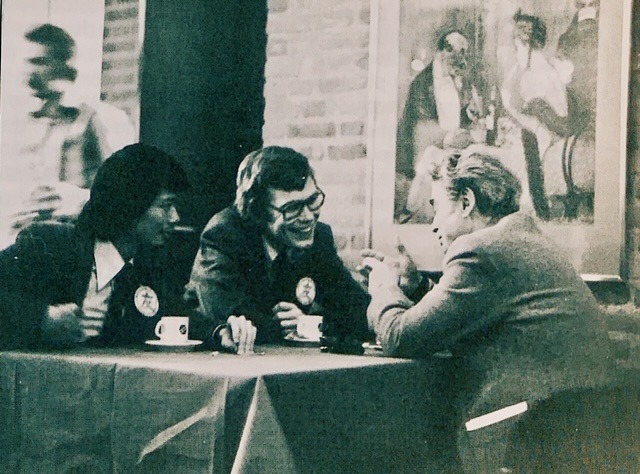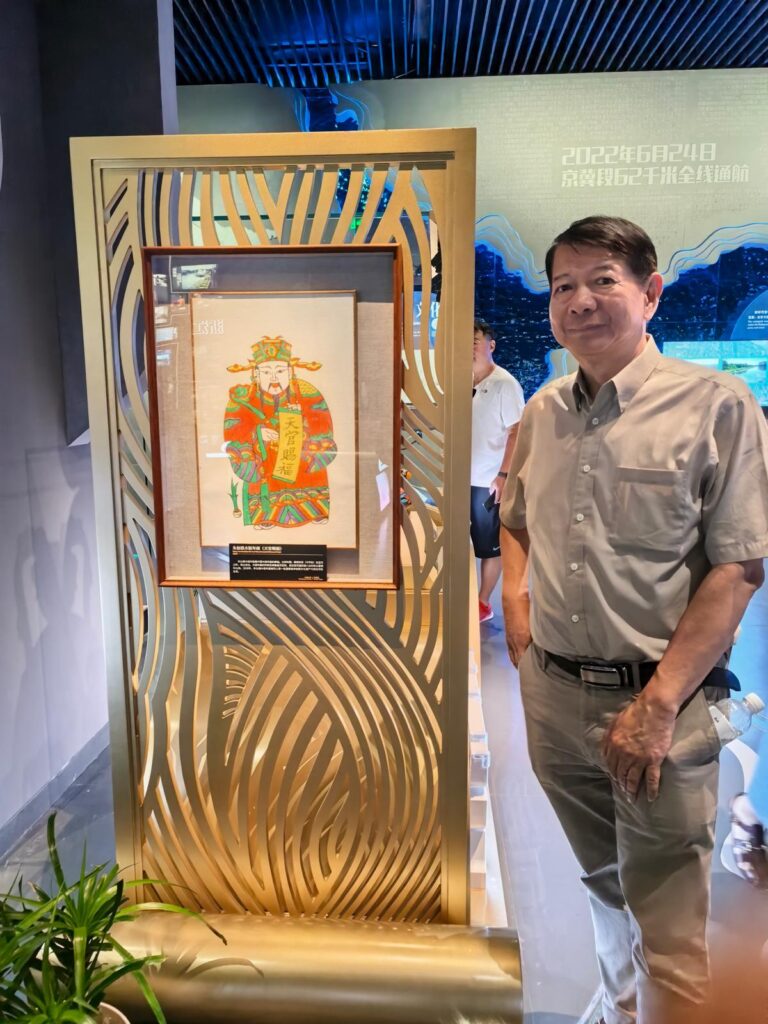by Astrid Bouwman
China means something different to everyone: for some a beloved travel destination, for others a professional fascination, a lifelong friendship, an academic field, or a personal memory. In this new series we give members of the Vereniging Nederland China a voice. Who are they, where does their interest in China come from, and how do they view China today?
It is fitting to open this series with an interview with a founding board member of the VNC, who remains active in the association to this day, currently with the China Dining Club: Oey Toen Ping.
Introducing Oey Toen Ping
Search for Oey Toen Ping online and you’ll find little more than a LinkedIn entry,no publications, no holiday snapshots.
But speak to him in person and you’re met with a rich life story, brimming with vivid anecdotes and thoughtful insights. Born in 1953, Ping lives in Rotterdam with his family and runs his own company, Shunda Consultancy. His work takes him frequently to different parts of China, though he is also deeply rooted in Rotterdam, his home base. Immediately after our interview, he was heading off to China again.
As a baby, Ping traveled with his Chinese-Indonesian parents to Indonesia, where the family spent twelve years. He grew up in Jakarta, attending primary school and learning Bahasa Indonesia, while Dutch was spoken at home. The atmosphere in those early post-independence years was strongly nationalistic. In 1965 the Oey family moved to the Netherlands. Although Ping spoke Dutch, the country itself was very much unknown to him.
First Encounter with China
Given his family background, Ping’s interest in China was perhaps inevitable, though he describes it as a gradual process of discovery and self-development. The first turning point was a study trip to China in 1975: “At the border crossing between China and Hong Kong, a customs officer mistook me for the group leader and spoke to me in Chinese. I was, after all, the only Chinese person in the group. That was the moment I realized something vital was missing from my luggage: the Chinese language.”
From that very first journey, Ping says he felt at home in China, and that feeling has never left him. The trip left a lasting impression and shaped the course of his life. “Life is a chain of coincidences,” he reflects. “One coincidence led me to the next step.” And many of those steps kept leading back to China.
A Founding Member of the VNC
At that time, China was still largely unknown in the Netherlands, though curiosity was steadily growing. After giving talks and slide presentations about his China trip to secondary schools and women’s associations, Ping became involved with the Stichting Nederland China (SNC). Out of this, in 1977, the Vereniging Nederland China was founded, with Ping serving on its very first board.
In 1978 he joined a VNC delegation to China at the invitation of the CPAFFC (Chinese People’s Association for Friendship with Foreign Countries). There, the idea was born to bring the Peking Opera to the Netherlands. Ping took on the organization of the tour. Thanks to a partnership with a professional theater agency and extensive publicity in De Telegraaf, the tour was a resounding success.
The Peking Opera adventure taught Ping many things, not least that he urgently needed to learn Chinese. He recalls the embarrassment of communicating with his 83 new friends – the Opera troupe – only through an interpreter. Having just graduated in sociology, he enrolled in sinology in Leiden and attended a summer course in China. Soon, he himself was working as an interpreter and was asked to accompany Chinese delegations visiting the Netherlands. He also joined the returning delegation accompanying Mayor Bram Peper to Shanghai and Beijing.

A World and a Century of Change
The transformations China has undergone over the past decades, Ping describes as “a world and a century of difference”: “Think back to that first trip in 1975, five layovers. Now the flight is direct. Back then, as a beginner in Chinese, I could serve as an interpreter. Today, everyone speaks English or carries a translation app. Developments in China move at breakneck speed, but not everywhere. The gap between city and countryside is enormous, and it remains fascinating that such different ‘time zones’ can exist side by side.” Another remarkable circumstance Ping has witnessed up close was the shift in China’s economy from centrally planned to market-driven in such a short span of time.
A Special Experience
In the late 1980s and early 1990s, Ping worked for Caldic, a chemical company active in China, among others. What began as doing business with state-owned enterprises quickly shifted to dealings with newly privatized firms. He feels privileged to have been a witness to this pivotal step in China’s economic development.
In his interactions with China, the focus was often on helping Chinese partners learn from the Netherlands. One particularly memorable experience was the invitation for a three-month internship at the Shanghai Museum, where Ping immersed himself in porcelain studies and received private lessons from a renowned Chinese curator.
Never Do Things by Halves
When asked if he can recommend a book, film, or exhibition on China to readers of ChinaNU+, Ping pauses for a moment. He explains that when Chinese acquaintances ask him how to understand the Western world, he advises them to study the Bible. Not for religious reasons, but to grasp the values embedded in its stories, such as compassion and sacrifice. By the same reasoning, he highlights three Chinese literary classics as essential for anyone wishing to understand Chinese culture, not for the plots alone, but for the lessons carried within the narratives:
- The Dream of the Red Chamber by Cao Xueqin (translated into Dutch)
- Romance of the Three Kingdoms; by Luo Guanzhong
- Water Margins; (attributed to Shi Nai’an)
And, he adds with a smile, this is only a beginning. For readers with a deeper interest in Chinese culture, he has a much longer list at the ready.
Learning to See Better
Ping believes that Western views of China are dominated by an American narrative: China as the enemy, the country that steals our knowledge and technology. He feels this framing leaves no space for the realities of China’s internal development or its changing role in the world. “People repeat what they hear without truly delving into the country’s challenges, its history, or its culture.”
With his story, Ping hopes to encourage readers to look more closely and more carefully at what is actually happening in China, rather than repeating ‘selective news’: “The country has a long history and a rich culture. Anyone who wants to get ahead in today’s world must take the time to learn from it.”


